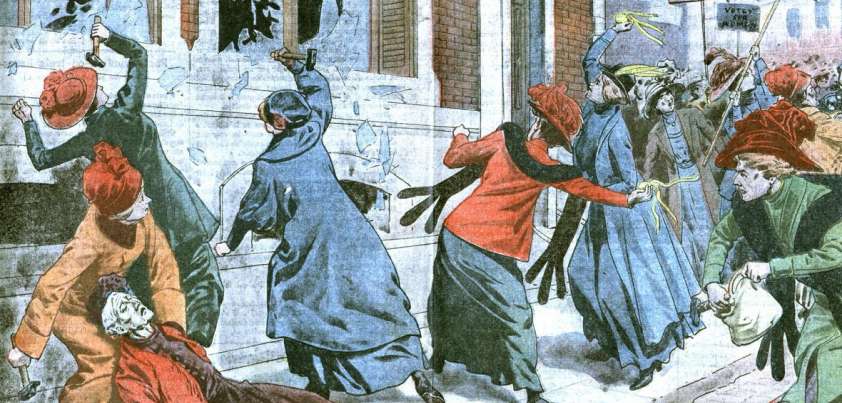 H. H. Munro (aka Saki)’s story Hermann the Irascible is a classic example of the use of reverse psychology to achieve a desired result. The story first appeared in 1909 at the height of the suffrage movement in Britain. As in the story, this involved mass demonstrations (of both man and women) across the country. Many readers are critical of the story because they feel that it trivializes women’s rights. The point they miss is that Saki’s use of satire is so “over the top” here that, rather than mocking the cause, the story highlights and supports it. More…
H. H. Munro (aka Saki)’s story Hermann the Irascible is a classic example of the use of reverse psychology to achieve a desired result. The story first appeared in 1909 at the height of the suffrage movement in Britain. As in the story, this involved mass demonstrations (of both man and women) across the country. Many readers are critical of the story because they feel that it trivializes women’s rights. The point they miss is that Saki’s use of satire is so “over the top” here that, rather than mocking the cause, the story highlights and supports it. More…
Category Archives: Quick Reads
The Portrait of a Lady
 Published in 1948, Khushwant Singh’s moving tribute to his grandmother was the first story of his long and distinguished writing career. The story spans a period of twenty years, from Singh’s earliest memories of the “so terribly old but always beautiful” woman, to her peaceful passing in almost surreal circumstances. He recalls their close friendship during his early schooling, the “turning point” when they moved to live with his parents in the city, and their growing estrangement as Western influences and higher education demands came between them. Themes: grandmother-grandson relationship (love, devotion), generation gap (education, culture), piety, change.
Published in 1948, Khushwant Singh’s moving tribute to his grandmother was the first story of his long and distinguished writing career. The story spans a period of twenty years, from Singh’s earliest memories of the “so terribly old but always beautiful” woman, to her peaceful passing in almost surreal circumstances. He recalls their close friendship during his early schooling, the “turning point” when they moved to live with his parents in the city, and their growing estrangement as Western influences and higher education demands came between them. Themes: grandmother-grandson relationship (love, devotion), generation gap (education, culture), piety, change.
The Laugher
 It is tempting to dismiss this story by Heinrich Böll as an entertaining bit of nonsense. On the surface, it is the unlikely tale of a once aspiring actor whose only talent is laughing convincingly and, where required, infectiously on demand. Although much sought after and a financial success, he detests the work because laughter is not in line with his usually sombre character. The story is a sad metaphor for the millions of people around the world who also find themselves trapped in unsatisfying jobs for which they may not be suited. More…
It is tempting to dismiss this story by Heinrich Böll as an entertaining bit of nonsense. On the surface, it is the unlikely tale of a once aspiring actor whose only talent is laughing convincingly and, where required, infectiously on demand. Although much sought after and a financial success, he detests the work because laughter is not in line with his usually sombre character. The story is a sad metaphor for the millions of people around the world who also find themselves trapped in unsatisfying jobs for which they may not be suited. More…
The Story of an Hour
 Kate Chopin’s The Story of an Hour received a mixed reaction when first published. Released into a male dominated world, the story supports equality for women. The idea that a wife could feel free, free, free and have a look of triumph in her eyes after hearing about her husband’s death was unheard of. It is fortunate that Chopin decided to end the story with Louise dying from joy that kills. One critic has suggested that it would never have been published if she had lived happily ever after. Themes include identity, marriage (oppression vs. love), personal freedom, and grief. More…
Kate Chopin’s The Story of an Hour received a mixed reaction when first published. Released into a male dominated world, the story supports equality for women. The idea that a wife could feel free, free, free and have a look of triumph in her eyes after hearing about her husband’s death was unheard of. It is fortunate that Chopin decided to end the story with Louise dying from joy that kills. One critic has suggested that it would never have been published if she had lived happily ever after. Themes include identity, marriage (oppression vs. love), personal freedom, and grief. More…
The Dinner Party
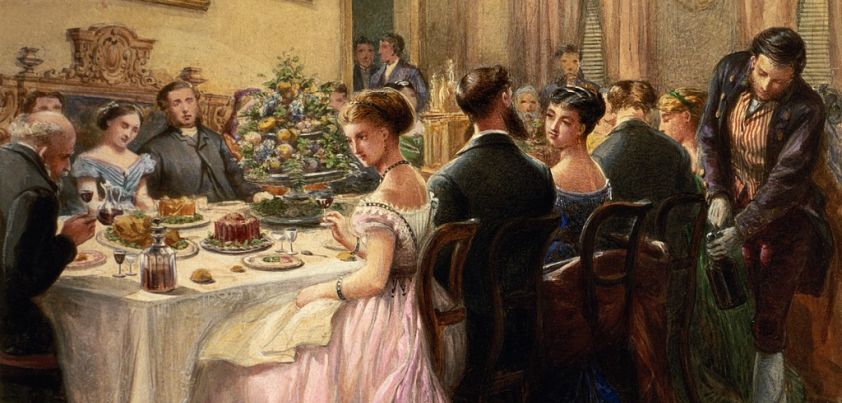 The theme of Mona Gardner’s The Dinner Party is gender stereotyping. The story is a satire of attitudes towards women in upper class colonial England. It begins with a debate over dinner between an army officer and young girl. The officer argues that men are better than women at staying calm during a crisis. The host’s wife proves him wrong by demonstrating nerves of steel when the guests are threatened by a deadly visitor. Although one of the other guests foreshadows the looming danger, the full extent of the woman’s courage is not evident until the final paragraph. More…
The theme of Mona Gardner’s The Dinner Party is gender stereotyping. The story is a satire of attitudes towards women in upper class colonial England. It begins with a debate over dinner between an army officer and young girl. The officer argues that men are better than women at staying calm during a crisis. The host’s wife proves him wrong by demonstrating nerves of steel when the guests are threatened by a deadly visitor. Although one of the other guests foreshadows the looming danger, the full extent of the woman’s courage is not evident until the final paragraph. More…
The Bus Driver Who Wanted To Be God
 In this Etgar Keret story, a bus driver cares more about social justice than kindness. This may explain why he didn’t get the job he really wanted – to be God. The driver’s attitude suddenly changes when he has an epiphany moment witnessing the misery of Eddie, the world’s nicest loser, who is running late for an important date. Eddie believes that he has found true love in ‘Happiness’, the world’s sweetest girl. Unfortunately, Happiness proves to be a little too sweet. She is planning to stand Eddie up rather than hurt his feelings by admitting she already has a boyfriend. More…
In this Etgar Keret story, a bus driver cares more about social justice than kindness. This may explain why he didn’t get the job he really wanted – to be God. The driver’s attitude suddenly changes when he has an epiphany moment witnessing the misery of Eddie, the world’s nicest loser, who is running late for an important date. Eddie believes that he has found true love in ‘Happiness’, the world’s sweetest girl. Unfortunately, Happiness proves to be a little too sweet. She is planning to stand Eddie up rather than hurt his feelings by admitting she already has a boyfriend. More…
The Butler
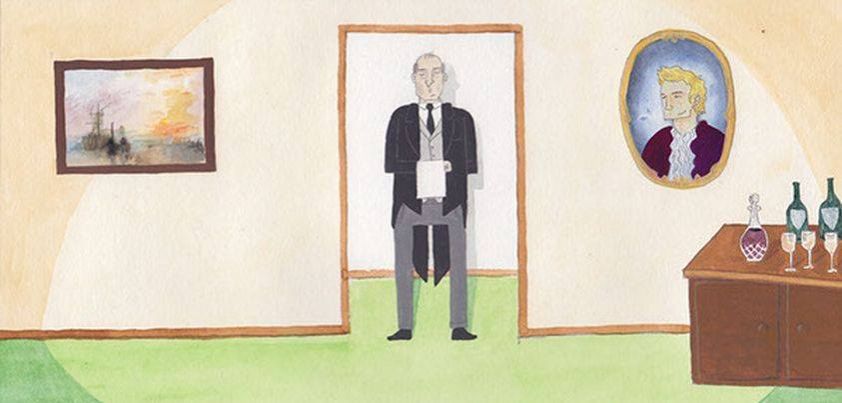 This story by Roald Dahl is about a newly rich man who tries to buy his way up the social ladder. He employs an expensive butler and French chef and hosts many lavish dinner parties. To impress his guests, he buys some of the world’s best wines and learns a lot about them. What he doesn’t learn about are the things that should and shouldn’t be served with fine wine and how to enjoy it. The butler takes advantage of this, and in so doing puts an end to the rich man’s high society hopes. More…
This story by Roald Dahl is about a newly rich man who tries to buy his way up the social ladder. He employs an expensive butler and French chef and hosts many lavish dinner parties. To impress his guests, he buys some of the world’s best wines and learns a lot about them. What he doesn’t learn about are the things that should and shouldn’t be served with fine wine and how to enjoy it. The butler takes advantage of this, and in so doing puts an end to the rich man’s high society hopes. More…
The House on Mango Street / Those Who Don’t / Alicia and I Talking…
 Today we have three short vignettes from Sandra Cisneros’s House on Mango Street. Each deals with an aspect of “place”. The protagonist’s Mexican-American family moves to a new neighborhood. Although far from perfect, their small house is special because they own it. It lies in a Hispanic part of town that most outsiders consider dangerous. However, the only time they feel scared is if they drive through “another color’s” neighborhood. A year later, the protagonist reflects on why the house (of which she is ashamed) doesn’t yet feel like home. Themes: childhood, family, shame, belonging, house vs. home. More…
Today we have three short vignettes from Sandra Cisneros’s House on Mango Street. Each deals with an aspect of “place”. The protagonist’s Mexican-American family moves to a new neighborhood. Although far from perfect, their small house is special because they own it. It lies in a Hispanic part of town that most outsiders consider dangerous. However, the only time they feel scared is if they drive through “another color’s” neighborhood. A year later, the protagonist reflects on why the house (of which she is ashamed) doesn’t yet feel like home. Themes: childhood, family, shame, belonging, house vs. home. More…
Earthmen Bearing Gifts
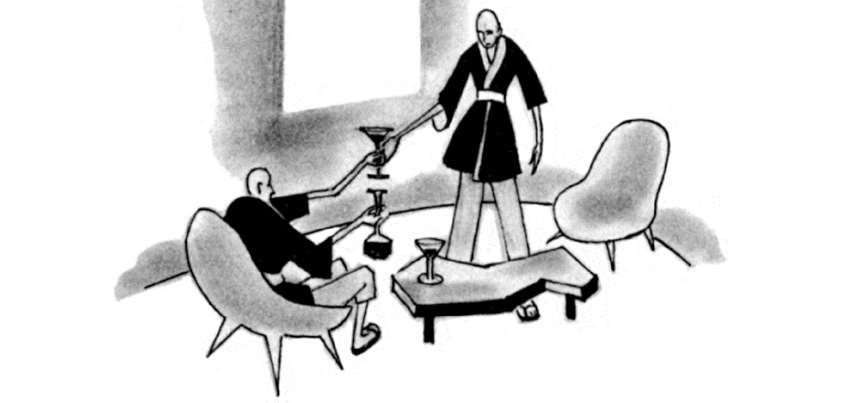 In this sardonic science-fiction story by Fredrick Brown, the people of Mars are looking forward to their first ever visit from Earth. The planets have long planned an exchange of gifts. Each civilization is more advanced in an important area of science. Martians have mastered the para-psychological sciences. They can teach Earthmen how to avoid crime and war through telepathy, telekinesis and empathy. The Earth has made greater progress in technology and the physical sciences. This could help the Martians restore their dying planet. Earth’s first “gift”, delivered in an unmanned spacecraft, is not what the Martians expected. Theme: betrayal. More…
In this sardonic science-fiction story by Fredrick Brown, the people of Mars are looking forward to their first ever visit from Earth. The planets have long planned an exchange of gifts. Each civilization is more advanced in an important area of science. Martians have mastered the para-psychological sciences. They can teach Earthmen how to avoid crime and war through telepathy, telekinesis and empathy. The Earth has made greater progress in technology and the physical sciences. This could help the Martians restore their dying planet. Earth’s first “gift”, delivered in an unmanned spacecraft, is not what the Martians expected. Theme: betrayal. More…
Reunion
 This story by Arthur C. Clarke packs a powerful message into just two pages. It takes the form of a radio message reassuring the people of Earth that they have nothing to fear from a group of beings approaching from space. The visitors claim to share a common ancestry with man, both being descended from an advanced race of aliens who colonized Earth during the time of the dinosaurs. Those who could fled when a terrible genetic plague brought on division, conflict and savagery among the population. They are returning with a cure for any who might still be affected. More…
This story by Arthur C. Clarke packs a powerful message into just two pages. It takes the form of a radio message reassuring the people of Earth that they have nothing to fear from a group of beings approaching from space. The visitors claim to share a common ancestry with man, both being descended from an advanced race of aliens who colonized Earth during the time of the dinosaurs. Those who could fled when a terrible genetic plague brought on division, conflict and savagery among the population. They are returning with a cure for any who might still be affected. More…
A Clean Well-Lighted Place
 This story by Ernest Hemingway takes place in a cafe. Two waiters (one young, the other middle-aged) talk about an old man sitting alone at one of the tables. A line from each waiter exemplifies three major themes. From the young waiter: I wouldn’t want to be that old. An old man is a nasty thing. (attitudes towards the aged). From the older waiter: It [life] was all a nothing and a man was a nothing too. (emptiness and despair). Other themes include aging and death, gender stereotyping, and the fact that money doesn’t buy happiness. More…
This story by Ernest Hemingway takes place in a cafe. Two waiters (one young, the other middle-aged) talk about an old man sitting alone at one of the tables. A line from each waiter exemplifies three major themes. From the young waiter: I wouldn’t want to be that old. An old man is a nasty thing. (attitudes towards the aged). From the older waiter: It [life] was all a nothing and a man was a nothing too. (emptiness and despair). Other themes include aging and death, gender stereotyping, and the fact that money doesn’t buy happiness. More…
Barney
 It is hard to write an introduction to this Will Stanton story without giving the ending away. Like another of our featured stories, Flowers for Algernon, the plot involves a scientist conducting a bizarre experiment to increase the intelligence of a very special rat (in this case Barney). The major theme is the potential catastrophic effect of poorly controlled scientific experiments. Because Barney is humanized a little more than Algernon (he enjoys flipping through books in the library as opposed to simply running through mazes), a secondary theme is the ethics of animal testing. Other themes: deception, narrow-mindedness, revenge. More…
It is hard to write an introduction to this Will Stanton story without giving the ending away. Like another of our featured stories, Flowers for Algernon, the plot involves a scientist conducting a bizarre experiment to increase the intelligence of a very special rat (in this case Barney). The major theme is the potential catastrophic effect of poorly controlled scientific experiments. Because Barney is humanized a little more than Algernon (he enjoys flipping through books in the library as opposed to simply running through mazes), a secondary theme is the ethics of animal testing. Other themes: deception, narrow-mindedness, revenge. More…
Babycakes
 Although written for a worthy cause, many readers find this short satirical vignette by Neil Gaiman very disturbing. It was featured in the 1991 anthology comic Born to be Wild, sales of which benefited PETA (People for the Ethical Treatment of Animals). The story provides a modern take on Jonathan Swift’s infamous 1729 satirical essay A Modest Proposal, which advocated solving an Irish famine by having the very poor sell their babies to the rich: “A young healthy child well nursed, is, at a year old, a most delicious nourishing and wholesome food, whether stewed, roasted, baked, or boiled…” OMG! More…
Although written for a worthy cause, many readers find this short satirical vignette by Neil Gaiman very disturbing. It was featured in the 1991 anthology comic Born to be Wild, sales of which benefited PETA (People for the Ethical Treatment of Animals). The story provides a modern take on Jonathan Swift’s infamous 1729 satirical essay A Modest Proposal, which advocated solving an Irish famine by having the very poor sell their babies to the rich: “A young healthy child well nursed, is, at a year old, a most delicious nourishing and wholesome food, whether stewed, roasted, baked, or boiled…” OMG! More…
The Other Wife / Woman
 In this vignette by French author Colette, a recently married couple visiting a restaurant chance upon the husband’s ex-wife. She is attractive, sophisticated and self-assured. Alice, the new wife, is younger, naïve, submissive and insecure. The self-centered, controlling husband cannot understand why his first wife had “difficulty” with their relationship. The new marriage, in which Alice flirtatiously plays the part of a trophy wife, appears more to his liking. Unfortunately for him, the encounter raises doubts and a question in Alice’s mind: What more did she (the ex-wife) want from him? She finds herself envying and respecting the stronger woman. More…
In this vignette by French author Colette, a recently married couple visiting a restaurant chance upon the husband’s ex-wife. She is attractive, sophisticated and self-assured. Alice, the new wife, is younger, naïve, submissive and insecure. The self-centered, controlling husband cannot understand why his first wife had “difficulty” with their relationship. The new marriage, in which Alice flirtatiously plays the part of a trophy wife, appears more to his liking. Unfortunately for him, the encounter raises doubts and a question in Alice’s mind: What more did she (the ex-wife) want from him? She finds herself envying and respecting the stronger woman. More…
Last Day at School
 This very short story describes the feelings of a teacher on the last day of a school year. It is clear from the story that the teacher cares greatly for his students. Grades have been sent home and the long holiday is about to begin. For the teacher, it is an especially memorable day. As well as being the end of the school year, he is leaving teaching and moving on to a different career. Last Day at School was written by Italian teacher-turned-journalist Giovanni Mosca, and presumably talks about his own feelings on leaving teaching in 1936. More…
This very short story describes the feelings of a teacher on the last day of a school year. It is clear from the story that the teacher cares greatly for his students. Grades have been sent home and the long holiday is about to begin. For the teacher, it is an especially memorable day. As well as being the end of the school year, he is leaving teaching and moving on to a different career. Last Day at School was written by Italian teacher-turned-journalist Giovanni Mosca, and presumably talks about his own feelings on leaving teaching in 1936. More…
Yellow Fish
 On the surface, this story by C. S. Lakshimi (aka Ambai) is about a grieving mother who arranges the rescue of a discarded fish dying on the shore because its struggles remind her of those of her premature baby Jalaja before she died. The story also reflects the cycle of life (the vibrant colors and frenetic activity associated with return of the fishing fleet), death (Jalaja’s passing and the yellow fish flapping on the sand) and rebirth (the fish’s return to the sea). Themes include loss, grief, insensitivity, maternalism, the cycle of life. More…
On the surface, this story by C. S. Lakshimi (aka Ambai) is about a grieving mother who arranges the rescue of a discarded fish dying on the shore because its struggles remind her of those of her premature baby Jalaja before she died. The story also reflects the cycle of life (the vibrant colors and frenetic activity associated with return of the fishing fleet), death (Jalaja’s passing and the yellow fish flapping on the sand) and rebirth (the fish’s return to the sea). Themes include loss, grief, insensitivity, maternalism, the cycle of life. More…
The Disk
 Jorge Borges gives this story a timeless quality by setting it in medieval times and framing it like a fairy-tale. A traveler arrives at an isolated woodcutter’s hut claiming to be an exiled king descended from Odin, the Norse king of the gods. He supports this by showing the woodcutter what he believes to be the disk of Odin, the only one-dimensional object in the universe. Ironically, the woodcutter answers: I do not worship Odin, I worship Christ… and then kills him to possess Odin’s disk. Theme: the desire to own something that holds power over the world around us. More…
Jorge Borges gives this story a timeless quality by setting it in medieval times and framing it like a fairy-tale. A traveler arrives at an isolated woodcutter’s hut claiming to be an exiled king descended from Odin, the Norse king of the gods. He supports this by showing the woodcutter what he believes to be the disk of Odin, the only one-dimensional object in the universe. Ironically, the woodcutter answers: I do not worship Odin, I worship Christ… and then kills him to possess Odin’s disk. Theme: the desire to own something that holds power over the world around us. More…
There’s a Man in the Habit of Hitting Me on the Head with an Umbrella
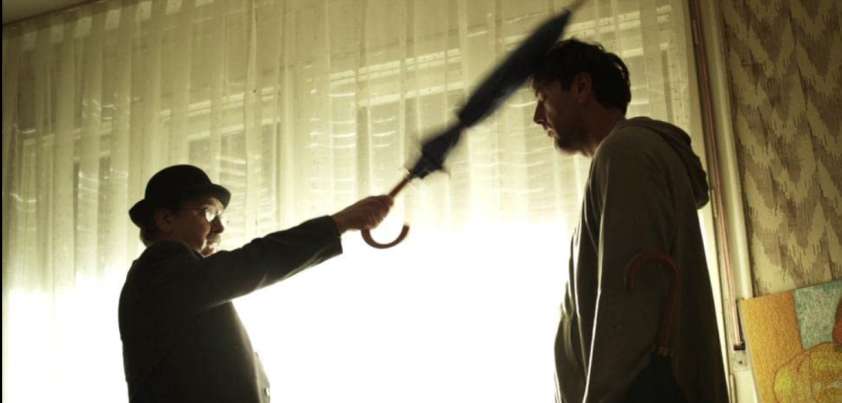 The long title of this absurdist story from Fernando Sorrentino neatly summarizes the plot. The only other thing readers need to know is that the protagonist reaches the point where he does not think he can live without the torment of the “umbrella man”. I have seen a number of metaphoric interpretations of the story. Most involve successfully dealing with the constant pressures (deadlines, annoyances and interruptions) of modern life. A more concerning interpretation is our growing indifference towards things we know to be wrong (e.g. third-world hunger and disease) as a result of being reminded about them so often. More…
The long title of this absurdist story from Fernando Sorrentino neatly summarizes the plot. The only other thing readers need to know is that the protagonist reaches the point where he does not think he can live without the torment of the “umbrella man”. I have seen a number of metaphoric interpretations of the story. Most involve successfully dealing with the constant pressures (deadlines, annoyances and interruptions) of modern life. A more concerning interpretation is our growing indifference towards things we know to be wrong (e.g. third-world hunger and disease) as a result of being reminded about them so often. More…
The Censors
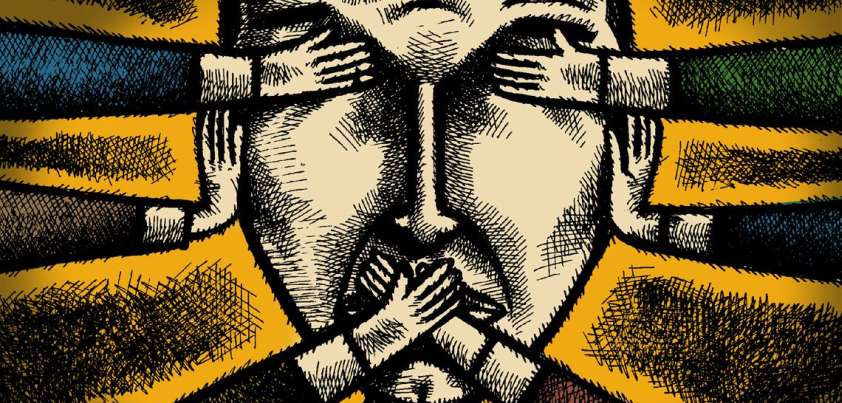 Luisa Valenzuela’s The Censors is set in Argentina during the mid-1970’s, a time of political unrest where all communications were screened and censored for anti-government content. The protagonist (Juan) is worried that something he may have innocently written in a letter to a friend could be interpreted the wrong way. He decides to get a job at the censorship office and try to intercept the letter. In an ironic twist, Juan is so good at the job that he is promoted to a top position. Unfortunately, Juan’s effectiveness and dedication to the work leads to his downfall. More…
Luisa Valenzuela’s The Censors is set in Argentina during the mid-1970’s, a time of political unrest where all communications were screened and censored for anti-government content. The protagonist (Juan) is worried that something he may have innocently written in a letter to a friend could be interpreted the wrong way. He decides to get a job at the censorship office and try to intercept the letter. In an ironic twist, Juan is so good at the job that he is promoted to a top position. Unfortunately, Juan’s effectiveness and dedication to the work leads to his downfall. More…
A Dead Woman’s Secret
 We get a sense at the beginning of this Guy de Maupassant story that the dead woman lying peacefully in her bed may not have led as ‘saintly’ a life as is described. She has been hiding something from her family for most of her life. When going through some old letters, her son and daughter discover the secret. The son, a sanctimonious magistrate, judges her harshly. The daughter, who has devoted herself to the Church, says nothing but may harbor a secret of her own. Themes: things are not always as they seem, passion, adultery, rash judgement, hypocrisy, forgiveness More…
We get a sense at the beginning of this Guy de Maupassant story that the dead woman lying peacefully in her bed may not have led as ‘saintly’ a life as is described. She has been hiding something from her family for most of her life. When going through some old letters, her son and daughter discover the secret. The son, a sanctimonious magistrate, judges her harshly. The daughter, who has devoted herself to the Church, says nothing but may harbor a secret of her own. Themes: things are not always as they seem, passion, adultery, rash judgement, hypocrisy, forgiveness More…
Ruthless
 The protagonist in this story by William C. de Mille is a narcissistic businessman. One of its themes is excessive materialism. The man is so obsessed with his possessions, including small items such as a bottle of Bourbon, that he would kill to prevent other people from having them. The major themes are vengeance and justice. The man’s wife points out that his actions in trying to take revenge on those who drank some of his liquor the previous winter go beyond justice: the law doesn’t punish burglary by death; so what right have you? In the end, justice prevails. More…
The protagonist in this story by William C. de Mille is a narcissistic businessman. One of its themes is excessive materialism. The man is so obsessed with his possessions, including small items such as a bottle of Bourbon, that he would kill to prevent other people from having them. The major themes are vengeance and justice. The man’s wife points out that his actions in trying to take revenge on those who drank some of his liquor the previous winter go beyond justice: the law doesn’t punish burglary by death; so what right have you? In the end, justice prevails. More…
Crossing the Zbrucz / My First Goose / Salt
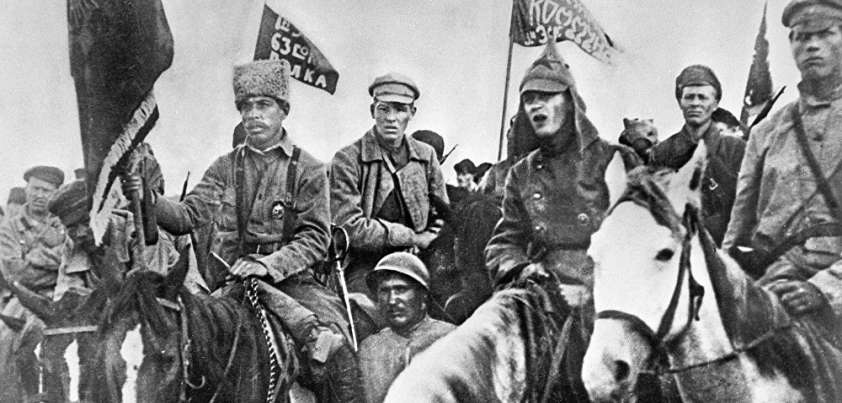 Today we have three stories (Crossing the Zbrucz, My First Goose and Salt) from Red Cavalry, a collection of edited entries from the war diary of Russian author Isaac Babel. The stories reflect his time as a journalist / propagandist attached to the First Cavalry unit of the Red Army during the Polish-Soviet War of 1920. These are not typical war stories involving great battles and inspiring heroes. Instead, the book provides a graphic insight into the human impact of the war on those fighting it, as well as the casualties and brutalities inflicted by both sides on innocent civilians. More…
Today we have three stories (Crossing the Zbrucz, My First Goose and Salt) from Red Cavalry, a collection of edited entries from the war diary of Russian author Isaac Babel. The stories reflect his time as a journalist / propagandist attached to the First Cavalry unit of the Red Army during the Polish-Soviet War of 1920. These are not typical war stories involving great battles and inspiring heroes. Instead, the book provides a graphic insight into the human impact of the war on those fighting it, as well as the casualties and brutalities inflicted by both sides on innocent civilians. More…
The Young Man Who Flew Past
 Writers must have a disproportionate fascination with heights, because there are a number of well-known stories in world literature about people falling, jumping or being pushed/thrown from tall buildings. Published in 1915, this short satire of middle-class society by Arkady Averchenko may be one of the first. A husband throws his wife’s lover from the sixth floor window of their apartment building. Through the windows on the way down, the falling man sees different ways his life could have gone. As he reaches the bottom, he is happy with his gruesome fate. Theme: men’s ‘destiny’ (ambition, marriage, family, adultery, depression, death). More…
Writers must have a disproportionate fascination with heights, because there are a number of well-known stories in world literature about people falling, jumping or being pushed/thrown from tall buildings. Published in 1915, this short satire of middle-class society by Arkady Averchenko may be one of the first. A husband throws his wife’s lover from the sixth floor window of their apartment building. Through the windows on the way down, the falling man sees different ways his life could have gone. As he reaches the bottom, he is happy with his gruesome fate. Theme: men’s ‘destiny’ (ambition, marriage, family, adultery, depression, death). More…
Stories of the Bad & Good Little Boys
 We are presenting these stories from Samuel Clemens (aka Mark Twain) together because, although the characters appear to be opposites, they actually support the same themes: 1) all people have a bad and/or selfish side; and 2) whether good or bad, people don’t always get the reward/punishment they deserve. While the bad boy appears inherently evil, the “good” boy’s motivation is his selfish wish for eternal praise. With its over-the-top sarcasm, the story of the bad little boy has an even more depressing message… bad boys grow into bad men, and the worst of them end up becoming successful politicians! More…
We are presenting these stories from Samuel Clemens (aka Mark Twain) together because, although the characters appear to be opposites, they actually support the same themes: 1) all people have a bad and/or selfish side; and 2) whether good or bad, people don’t always get the reward/punishment they deserve. While the bad boy appears inherently evil, the “good” boy’s motivation is his selfish wish for eternal praise. With its over-the-top sarcasm, the story of the bad little boy has an even more depressing message… bad boys grow into bad men, and the worst of them end up becoming successful politicians! More…
A Haunted House
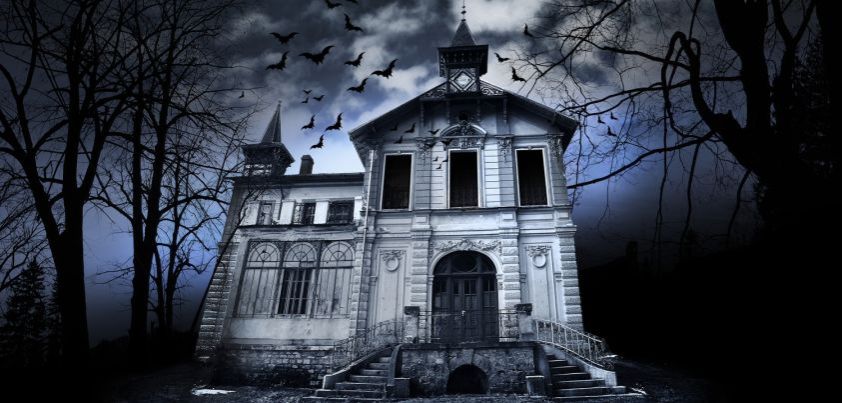 If you read Virginia Woolf‘s A Haunted House expecting it to be a horror story, you will come away disappointed. Rather than scary, the best words I can think of to describe the story are “sweet and sour”. Sweet because it involves two ghosts who are still very much in love after hundreds of years. Sour because (for me) Woolf confuses the plot with a little too much poetic prose. Although the central theme of the story is love, its message is more focused. Life is short, so we should treasure each moment we spend with the ones we love. More…
If you read Virginia Woolf‘s A Haunted House expecting it to be a horror story, you will come away disappointed. Rather than scary, the best words I can think of to describe the story are “sweet and sour”. Sweet because it involves two ghosts who are still very much in love after hundreds of years. Sour because (for me) Woolf confuses the plot with a little too much poetic prose. Although the central theme of the story is love, its message is more focused. Life is short, so we should treasure each moment we spend with the ones we love. More…
Almost No Memory
 When Lydia Davis wrote this flash story, she may have been reminded of a quote attributed to Albert Einstein: Never memorize what you can look up. Some people have a knack for remembering almost every detail of past events; others have a talent for putting names to faces or remembering facts and figures. However, most of us forget more than we remember. A word that often comes up in describing Davis’s writing is “playful”. Here she takes a playful look at memory (or rather lack of it!), and then moves on to memories and their relationship to original thought. More…
When Lydia Davis wrote this flash story, she may have been reminded of a quote attributed to Albert Einstein: Never memorize what you can look up. Some people have a knack for remembering almost every detail of past events; others have a talent for putting names to faces or remembering facts and figures. However, most of us forget more than we remember. A word that often comes up in describing Davis’s writing is “playful”. Here she takes a playful look at memory (or rather lack of it!), and then moves on to memories and their relationship to original thought. More…
The Harvest
 This is one of a series of stories by Tomás Rivera about Mexican-American seasonal farm workers. The harvest is over, and as a group is looking forward to returning to their home base in Texas, they begin to wonder about the unusual behaviour of one of their older members. The single man with no family walks alone into the fields each afternoon, and refuses to allow anyone to follow. Rumors circulate among younger workers that he either is hiding his wages somewhere, or has found buried treasure. Themes include materialism, ritual, spiritual connection to nature and the land. More…
This is one of a series of stories by Tomás Rivera about Mexican-American seasonal farm workers. The harvest is over, and as a group is looking forward to returning to their home base in Texas, they begin to wonder about the unusual behaviour of one of their older members. The single man with no family walks alone into the fields each afternoon, and refuses to allow anyone to follow. Rumors circulate among younger workers that he either is hiding his wages somewhere, or has found buried treasure. Themes include materialism, ritual, spiritual connection to nature and the land. More…
The Slump
 In this story by John Updike, a professional baseball player tries to analyze why he is no longer hitting the ball as well as he used to. He was recruited for his batting, and is worried about losing his position on the team. He identifies that the problem is psychological (in the batting cage I own the place) and concludes that he has lost his passion for the game because it has no meaning for him anymore. Themes include self-knowledge, pressure to succeed (dread), liberation, the fleeting nature of fame, frustration, futility, shame, existentialism. More…
In this story by John Updike, a professional baseball player tries to analyze why he is no longer hitting the ball as well as he used to. He was recruited for his batting, and is worried about losing his position on the team. He identifies that the problem is psychological (in the batting cage I own the place) and concludes that he has lost his passion for the game because it has no meaning for him anymore. Themes include self-knowledge, pressure to succeed (dread), liberation, the fleeting nature of fame, frustration, futility, shame, existentialism. More…